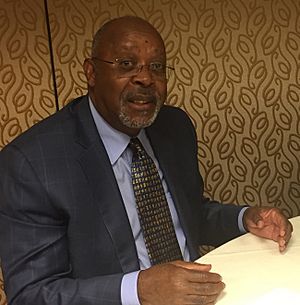Willie Pearson Jr. facts for kids
Quick facts for kids
Willie Pearson Jr.
|
|
|---|---|

Pearson in 2017
|
|
| Born |
Willie Pearson
29 June 1945 |
| Alma mater |
|
| Known for | Studies and encouragement of African-American scientists |
| Scientific career | |
| Fields |
|
| Institutions | |
| Thesis | One in a hundred: a study of black American science doctorates (1980) |
Willie Pearson Jr. is an American sociologist. A sociologist studies how people live and interact in groups. Dr. Pearson is known for his work helping more African-Americans, other minority groups, and women get involved in science.
He has written several books about the experiences of African-American scientists who have earned PhDs. These books include important studies on chemists and engineers. Dr. Pearson has also played a big role in creating policies to help minorities and women in science. For example, he led a special committee called the Committee on Equal Opportunities in Science and Engineering (CEOSE). This committee works with the National Science Foundation (NSF). He also advised the U.S. president on Historically Black Colleges and Universities.
Early Life and School
Willie Pearson was born in Rusk, Texas, on June 29, 1945. He and his older sister were raised by their mother. He went to Emmett J. Scott High School in Tyler, Texas.
After high school, he studied at Wiley College. This is a historically Black college. He earned his first degree in sociology in 1968. In 1971, he got his master's degree in sociology from Atlanta University.
Later, Dr. Pearson continued his studies at Southern Illinois University at Carbondale. He earned his PhD in 1980 or 1981. His main research for his PhD was about African-American scientists with doctorates. He also did more studies after his PhD at places like the Educational Testing Service (ETS).
Working in Sociology
After getting his master's degree, Dr. Pearson worked for a short time for the government. In 1972, he became a sociology professor at Grambling State University in Louisiana. In 1980, he moved to Wake Forest University in North Carolina.
In 2001, he became a professor and leader of the History and Sociology Department at the Georgia Institute of Technology in Atlanta. Soon after, he led the Committee on Equal Opportunities in Science and Engineering (CEOSE). This committee reports to the U.S. Congress every two years.
In 2010, President Barack Obama asked Dr. Pearson to join his Board of Advisors. This board helps Historically Black Colleges and Universities. Dr. Pearson has also served on many other important committees. These include groups for the National Institutes of Health (NIH) and the National Science Foundation (NSF).
Awards and Recognitions
Dr. Willie Pearson Jr. has received several awards for his important work:
- Congressional Fellowship: He received the Morris K. Udall Award in 1988-1989.
- Community Service Award: In 2000, he won the Donald O. Schoonmaker Faculty Award. This was for his help to the Wake Forest University community.
- Distinguished Lecturer: From 2001 to 2002, he was a special speaker for Sigma Xi. This is a honor society for scientific research.
- National Associate: In 2001, he became a National Associate of the National Academies of Sciences.
Books He Wrote
Dr. Pearson has written or helped write several books. These books often focus on the experiences of African-Americans and women in science:
- Black Scientists, White Society, and Colorless Science: a Study of Universalism in American Science (1985)
- Blacks, Science, and American Education (1989) (with H. Kenneth Bechtel)
- Who Will Do Science? Educating the Next Generation (1994)
- Beyond Small Numbers: Voices of African American PhD Chemists (2005)
- Changing the Face of Engineering: The African American Experience (2015) (Edited with John Brooks Slaughter and Yu Tao)
- Advancing Women in Science: An International Perspective (2015) (Edited with Lisa Frehill and Connie McNeely)
 | Dorothy Vaughan |
 | Charles Henry Turner |
 | Hildrus Poindexter |
 | Henry Cecil McBay |

